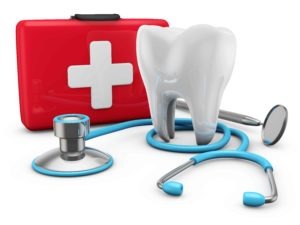
The good news about modern preventive dental care is that you can largely avoid the most common and destructive dental health issues, like cavities and gum disease. However, even the most advanced dental care can’t always help you prevent an emergency situation. If your tooth is significantly damaged, compromised, or knocked out of its socket, then schedule an dental emergency visit, and take these steps to prevent more extensive damage.
Most dental emergencies, however, involve some form of tooth sensitivity and pain. If your tooth suddenly hurts, then you might be facing a dental emergency and require prompt dental treatment. In the meantime, you can help make sure that your smile comes out on top by taking these few precautions.
Chipped, Fractured, or Broken Tooth
If you fall and break your tooth, you’ll probably know that you need emergency dental treatment. Injuries that cause structural damage to a tooth can really hurt. A cracked tooth that is a little sensitive does not deserve a Sunday evening phone call to your dentist. It can wait until Monday morning.
If you experience a toothache and notice that a piece of your tooth has chipped or broken off, then rinse your mouth carefully with warm water. If it’s bleeding, then apply pressure with clean moist gauze until the bleeding stops (usually no longer than about ten minutes) and call our office to schedule an appointment.
Partially Dislodged Tooth
If it is only partially displaced, try to straighten it out. If your tooth feels severely loose, it may be partially dislodged, especially if you’ve suffered a traumatic impact lately. Take great care not to pull the tooth out, and visit us immediately for appropriate treatment. A cold compress or ice pack to the side of the face can help reduce pain and swelling, and apply pressure by gently biting on gauze, if necessary, to hold the dislodged tooth in its socket. Often a loose tooth without pain is not a dental emergency.
Knocked-Out (dislodged) Tooth
If the force that your mouth or face suffered was enough to completely knock your tooth out of its socket, then quick action may allow you to save the tooth. Time is of the essence. Try to replace it back in the socket. Then call your dentist or endodontist to let them know you have a dental emergency.
If your tooth is out and you can’t get it back in, then call your dentist your dentist. He might be able to reinsert it instead of having to replace it. Rinse the tooth carefully, without touching its roots, and place it in a container of milk until you reach your dentist’s office. Lost teeth can often be most successfully replaced with a dental implant and crown.
A fractured tooth
If you chip your tooth, collect the piece(s) and bring them to our office. In some cases, Dr. Fondriest can reattach them. Dental bonding is sometimes used to restore chipped teeth as well.
If your tooth is cracked or fractured, then your emergency may include varying levels of tooth pain, depending on the severity of the crack. You can alleviate the pain temporarily by taking an over-the-counter pain reliever and by avoiding putting pressure on the tooth. If the tooth or the tissues around it are bleeding, then bite down gently on a clean, moist piece of gauze.
You are half done with a root canal and you are on a plane flight
Pressure changes can cause tremendous tooth pain on a plane flight if the tooth is not sealed. Fortunately, the root canal specialist almost always does seal it.
A broken tooth is usually not a dental emergency
If a piece of your tooth breaks off or an existing restoration, such as a filling or dental crown, becomes damaged, it is not usually an emergency unless the nerve is exposed. Then your tooth can be at an immediate threat of severe infection, or worse. Rinse your mouth carefully and collect the broken pieces of the tooth or restoration, then bring them with you to your emergency appointment.
Handling Pain with Dental Emergencies
For knocked out teeth or chipped teeth you can alleviate pain by holding a cold compress to the outside of the cheek, or by taking pain relief medication. Avoid aspirin as this type of medication thins the blood and may increase bleeding from injuries. For severe toothaches, use dental floss to try to dislodge any food particles that may be creating pressure.
Call Us Today if You Need Emergency Dental Care for a dental problem
Many true dental emergencies are subtle, and may develop gradually until they become a dire situation. These emergencies are the ones that the dentist finds at your checkup. Don’t wait for pain as it is a poor indicator of problems.
In the event of an emergency, contact our dentist office as soon as possible so that we can prepare for your visit. Be sure to explain the nature of your injury and give us any additional details that you feel are important.
If you experience severe tooth pain or other dental emergency, then schedule a consultation with your dentist as soon as possible by calling Lake Forest Dental Arts in Lake Forest, IL, at 847-234-0517. We also proudly serve residents of Chicago and all surrounding communities.
